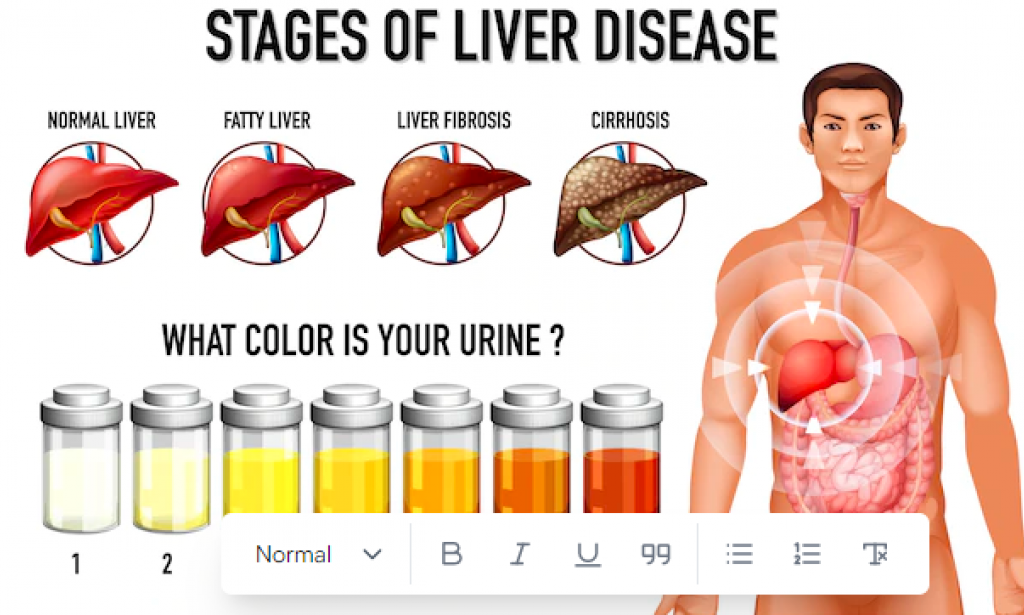10 Warning Signs That Your Fatty Liver Is Getting Worse
Fatty liver is a condition that affects millions of Americans and is typically caused by unhealthy lifestyle habits. It is characterized by the buildup of fat in the liver, which can lead to serious health complications. If left untreated, the condition can worsen and cause serious damage to the liver. Early detection and treatment are key to managing fatty liver disease.
Knowing the warning signs of when the condition is getting worse is essential to stopping the progression of the disease. In this article, we will discuss 10 warning signs that your fatty liver is getting worse and how to catch it early. We will also discuss the causes, symptoms, and treatments of fatty liver disease. By understanding these warning signs, you can take action to protect your liver before it’s too late.
What is fatty liver disease?
Fatty liver disease refers to the buildup of fat in the liver. It is a common health condition that can progress to more serious conditions if left untreated. There are three stages of fatty liver disease – minimal, moderate, and advanced. A healthy liver should contain around 30% fat, but in patients with fatty liver disease, this number can be closer to 60%. The condition can affect anyone, but certain groups may be more at risk.
These groups include alcoholics, people with diabetes, people with a history of heart disease, and individuals on certain medications. Fatty liver disease can be caused by a high-fat diet, type 2 diabetes, alcohol abuse, or genetic factors. It is also often found in those who are overweight or obese.
While the condition can be triggered by a few months of unhealthy habits, it can also progress over many years. Fatty liver can go unnoticed for a long time, but when it is found and diagnosed, it can be easily treated.
Symptoms of fatty liver disease
- Swollen abdomen - One of the signs of fatty liver disease is an enlarged abdomen. Your abdomen will appear swollen and bigger than normal. It is important to note that this is not the same swelling seen in other conditions, such as heart failure, which affects the whole body. An enlarged abdomen due to fatty liver disease will only be visible in your abdomen. - Itchy skin - Another early sign of the fatty liver disease is itchiness.
This may sound strange, but itching can occur due to the build-up of toxins in the blood. This can lead to a condition called urticaria, which is characterized by itchy, red bumps on the skin. - Fatigue - Fatigue is one of the most common signs of fatty liver disease and can often be mistaken for simple tiredness. Fatigue is a feeling of extreme tiredness that makes it difficult to complete daily tasks. - Weight gain - Another early sign of the fatty liver disease is weight gain.
This is often due to a high intake of calories and a low amount of physical activity. Other conditions, such as diabetes, can also cause weight gain due to an increase in food intake.
Fatty liver disease and diabetes are different conditions and have different warning signs. - Joint pain - Joint pain is another common symptom of fatty liver disease and can occur when the condition is at an advanced stage.
Causes of fatty liver disease
- High-fat diet - Eating too many fatty foods can put you at risk of developing fatty liver disease. Eating high amounts of trans fats and saturated fats can lead to the buildup of fat in the liver. - Overweight or obesity - Excess weight can put pressure on the liver, prompting the buildup of fat.
Being overweight and obese are two of the most common causes of fatty liver disease and can be prevented by maintaining a healthy diet and weight. - Type 2 diabetes - Type 2 diabetes can cause your body to produce more sugar, which is why it is referred to as ‘misguided’ diabetes.
This extra sugar ends up in the liver, where it is converted into fat. - Alcohol abuse - Alcohol abuse is a common cause of fatty liver disease and is more common in people with other health problems.
Warning signs that your fatty liver is getting worse
- Swollen abdomen - An enlarged abdomen can be a warning sign that the condition is progressing. If the condition is left untreated, the extra fat in the liver can lead to the build-up of fluid in the abdomen. This can cause swelling and result in an enlarged abdomen. - Changes in your skin - Changes in your skin may be an indication that fatty liver disease is progressing.
If the condition is left untreated, toxins can build up in the blood and lead to a condition called urticaria (also known as hives). Urticaria is characterized by red, itchy patches on the skin and is a sign that the condition is getting worse. - Weight gain - Excess weight gain can be a warning sign that fatty liver disease is progressing.

If you are currently overweight or obese, gaining weight can be a sign that the condition is getting worse. - Changes in your energy levels - Fatigue is a common sign of fatty liver disease and can be a warning that the condition is getting worse. - Joint pain - Joint pain is another common symptom of fatty liver disease and can be a warning of the condition getting worse.
Changes in your sleep - When the condition is at an advanced stage, it can cause sleep issues. - Changes in your mood - Changes in your mood can be a sign of the condition progressing.
Tests to diagnose fatty liver disease
- Blood test - A blood test can be used to detect the presence of certain fats in the blood. This can indicate whether there is an issue with fat build-up in the liver. - Abdominal ultrasound - An abdominal ultrasound can be used to see if the liver has accumulated fat. This is a non-invasive procedure that can be performed in a doctor’s office.
- Liver biopsy - A liver biopsy is a more invasive procedure that can be used to get a sample of liver tissue. This can be used to determine the extent of the condition and rule out other conditions.
- MRI - A magnetic resonance imaging (MRI) scan can be used to see if the liver is enlarged. This is a more advanced test than ultrasound and can also be used to detect any tumors or abnormalities in the liver.
Treatment options for fatty liver disease
- Dietary changes - Dietary changes are an important part of managing and treating fatty liver disease. In most cases, dietary changes can help manage the condition and prevent it from progressing. - Weight management - Excess weight is a major risk factor for fatty liver disease. Losing weight can help treat the condition and prevent it from progressing.
- Exercise - Regular exercise has several health benefits and can be used to treat fatty liver disease. Exercises such as swimming, jogging, and yoga can be used to treat the condition.
- Medications - Certain medications can be used to treat fatty liver disease. Medications include ursodiol (Urso), febuxostat (Uloric), and silymarin (Milk thistle).
How to prevent fatty liver disease
- Eat a healthy diet - A healthy diet is the first step to preventing fatty liver disease. Eating a balanced diet rich in vitamins and nutrients can help prevent the condition. - Limit alcohol intake - Limiting alcohol intake is one of the most effective ways to prevent fatty liver disease.
It is recommended that people drink no more than one drink per day. - Maintain a healthy weight - Excess weight can put pressure on the liver and increase the risk of developing fatty liver disease. - Be physically active - Regular exercise can help prevent fatty liver disease. It can also help treat the condition if it is already present. - Protect your liver.
- Protecting your liver can reduce your risk of developing fatty liver disease. Avoiding certain medications, such as acetaminophen (Tylenol), and avoiding high-risk occupations, such as working in law enforcement, can help reduce the risk of developing the condition.
Conclusion
Fatty liver disease is a common health problem that can progress to more serious conditions if left untreated. Eating a healthy diet, maintaining a healthy weight, and being physically active can help prevent the condition.
Early detection and treatment are key to stopping the progression of the disease. Knowing the warning signs of when the condition is getting worse is essential to catching it early. From there, treatment can be administered to prevent further damage to the liver.


يجب عليك تسجيل الدخول لتستطيع كتابة تعليق